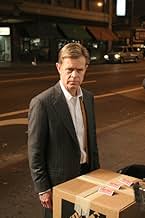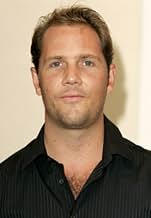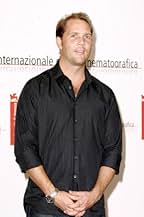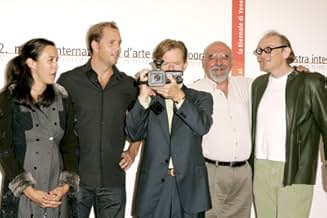CALIFICACIÓN DE IMDb
6.2/10
13 k
TU CALIFICACIÓN
El mensaje críptico de una adivina envía a Edmond Burke en un viaje exploratorio en los bajos fondos de Nueva York.El mensaje críptico de una adivina envía a Edmond Burke en un viaje exploratorio en los bajos fondos de Nueva York.El mensaje críptico de una adivina envía a Edmond Burke en un viaje exploratorio en los bajos fondos de Nueva York.
- Premios
- 3 premios ganados y 2 nominaciones en total
Opiniones destacadas
We have here a night of debauchery, violence, anger, and hate which could only be delivered by David Mamet's lyrical prose and the horror background of director Stuart Gordon. Think Scorsese's After Hours, but dead serious and shrouded in pitch black darkness. Much like Mamet's Oleanna, also based on his own play, Edmond features a tour de force performance from lead actor and real life friend William H. Macy. His character awakens to the mundane existence he has been a part of for 47 years and decides to go on an adventure to live life in the moment. You have not seen a crisis of identity lead a man to the depths of the hell within himself like you do here.
Gordon shoots the film with a bit of an off-kilter unease, showing the audience how fragile each moment is. At any time Macy's Edmond could fall in lust, partake in bigoted conversation, get mugged, find God, and even kill. Macy delivers an emotional clinic as he falls deeper and deeper into insanity or maybe just plain indifference. He is the star of the show and is on screen every second of the film just trying to give wisdom and take some for himself, not realizing the crazed malice infused in his face as he spouts his philosophy. The film is definitely not for the weak of heart, and not because of any real overdoing of blood and nudity, but because of the script itself. Each character is a racist and bigot of some sort, exposing their prejudices with candor. Edmond is on a journey of acceptance for who he really is. Where that trail ends may be surprising and also fitting at the same time, but if nothing else, it is the place he has been searching for his entire life.
This is definitely Macy, Mamet, and Gordon's film, but it wouldn't be as successful as it is without an abundance of name actors in extremely small roles helping to keep the adventure going. Mamet's wife Rebecca Pidgeon is great as always playing the wife Macy leaves; Mena Suvari and Julia Stiles are believable as two of the women he crosses paths with, both of whom are introduced as one thing but eventually allow their true colors to come through; and Joe Mantegna once again shows that he became an actor only to show the world how Mamet's words should be spoken. No one does it like Mantegna and no film penned by Mamet should be without him.
Edmond is a strangely intriguing film to experience. It is dialogue heavy and contains a strong lead turn from Macy. Everything that transpires does so as a result of what he has experienced beforehand. Macy would not end up where he does if all that happened this night of self-reflection did not occur in exactly the order that it does. Straight from the note his secretary gives him at the beginning, to the tarot reading soon after, the planets aligned and fate led him to his salvation/destruction. There are moments in which the story grinds to a bit of halt and takes a little to get back on track, but overall the experience is one not to be shaken easily from your consciousness.
Gordon shoots the film with a bit of an off-kilter unease, showing the audience how fragile each moment is. At any time Macy's Edmond could fall in lust, partake in bigoted conversation, get mugged, find God, and even kill. Macy delivers an emotional clinic as he falls deeper and deeper into insanity or maybe just plain indifference. He is the star of the show and is on screen every second of the film just trying to give wisdom and take some for himself, not realizing the crazed malice infused in his face as he spouts his philosophy. The film is definitely not for the weak of heart, and not because of any real overdoing of blood and nudity, but because of the script itself. Each character is a racist and bigot of some sort, exposing their prejudices with candor. Edmond is on a journey of acceptance for who he really is. Where that trail ends may be surprising and also fitting at the same time, but if nothing else, it is the place he has been searching for his entire life.
This is definitely Macy, Mamet, and Gordon's film, but it wouldn't be as successful as it is without an abundance of name actors in extremely small roles helping to keep the adventure going. Mamet's wife Rebecca Pidgeon is great as always playing the wife Macy leaves; Mena Suvari and Julia Stiles are believable as two of the women he crosses paths with, both of whom are introduced as one thing but eventually allow their true colors to come through; and Joe Mantegna once again shows that he became an actor only to show the world how Mamet's words should be spoken. No one does it like Mantegna and no film penned by Mamet should be without him.
Edmond is a strangely intriguing film to experience. It is dialogue heavy and contains a strong lead turn from Macy. Everything that transpires does so as a result of what he has experienced beforehand. Macy would not end up where he does if all that happened this night of self-reflection did not occur in exactly the order that it does. Straight from the note his secretary gives him at the beginning, to the tarot reading soon after, the planets aligned and fate led him to his salvation/destruction. There are moments in which the story grinds to a bit of halt and takes a little to get back on track, but overall the experience is one not to be shaken easily from your consciousness.
Interesting, if not altogether captivating slice o' night and consequences of one Edmond Burke; a man who is driven to the edge, and all areas after, following his decision to essentially walk away from everything due to feeling unfulfilled in life. Working from this always relate-able premise, Mamet crafts a more intelligent, more realistic version of last decade's controversial but safe Falling Down, and in turn offers some of the year's best societal release. Problems arise however when the actions slow down and the talking speeds up, where monologues and even back and forth dialogs seem to be coming from the writer's mouth instead of the characters. This all goes south in the second half, where Macy's sermonizing kills some of the script's authenticity and integrity, due to the long-winded, self righteous, and ultimately distracting and uninvolved nature of his lines. For a film that approaches a gritty New York night with style and ease, with a scriptwriter as esteemed and knowledgeable as David Mamet, it was a shame to see some of the later scenes become a pulpit for Mr. Mamet to talk through instead of more subtle suggestion, but it is still far from making this movie avoidable. With some of William H Macy's most powerful work, Edmond is still a triumph of a character based thriller, leaving me satisfied with it's profound conclusion.
At first glance, horror meister Stuart Gordon would not seem the obvious choice to direct an emotional psycho-drama cinematic rendering of a David Mamet play, yet with Edmond, he displays a deft touch for the material and allows the actors to carry the day.
Originally penned as a stage play, Edmond tells the story of namesake Edmond Burke (William H. Macy), a mundane white collar worker who has spent his entire life being a faceless cog in the big industrial machine. The rescheduling of a business appointment to 1:15 (a number which re-occurs in the film) propels him to idle away his time with a visit to a tarot reader who tells him he's not where he's supposed to be. From there he begins a slow spiral into depravity and insanity that begins with telling his wife he's leaving her and progresses to an outback-like dreamwalk into New York City's seedy underbelly of bars pimps and prostitutes.
Written in the wake of a divorce, Mamet infuses the script with racial discourse and epithets that are stunning in their caustic vulgarity as Edmond pours out years of pent up hatred on one of his muggers revealing a window into his shallow soul that only becomes more intensely evident as the movie reaches its conclusion.
In the scene where Edmond tells his wife their marriage is over, he explains to her that she hasn't satisfied him spiritually or emotionally for quite some time. Yet, after watching his progression trough the course of the story, it becomes clear that spiritually he has no soul, and emotionally he's a shallow but volatile cauldron of disjointed thoughts.
The film is a tour-de-force for Macy, who is in every scene and morphs from a character of Caspar Milquetoast proportions to unhinged bigoted psychopath and back again by the movie's end. Along the way he's complimented by solid performances from Joe Mantegna, Julia Stiles, Mena Suvari and Bokeem Woodbine. As if in a wink and nudge to his own work, Gordon even manages to insinuate longtime stalwart Jeffrey Combs into a small but telling scene during Edmond's descent into insanity.
By the time Edmond arrives at the end of that journey, however; at that place where he ought to be; I couldn't help but think he had merely wasted his life catching up to where his soul was long ago.
Originally penned as a stage play, Edmond tells the story of namesake Edmond Burke (William H. Macy), a mundane white collar worker who has spent his entire life being a faceless cog in the big industrial machine. The rescheduling of a business appointment to 1:15 (a number which re-occurs in the film) propels him to idle away his time with a visit to a tarot reader who tells him he's not where he's supposed to be. From there he begins a slow spiral into depravity and insanity that begins with telling his wife he's leaving her and progresses to an outback-like dreamwalk into New York City's seedy underbelly of bars pimps and prostitutes.
Written in the wake of a divorce, Mamet infuses the script with racial discourse and epithets that are stunning in their caustic vulgarity as Edmond pours out years of pent up hatred on one of his muggers revealing a window into his shallow soul that only becomes more intensely evident as the movie reaches its conclusion.
In the scene where Edmond tells his wife their marriage is over, he explains to her that she hasn't satisfied him spiritually or emotionally for quite some time. Yet, after watching his progression trough the course of the story, it becomes clear that spiritually he has no soul, and emotionally he's a shallow but volatile cauldron of disjointed thoughts.
The film is a tour-de-force for Macy, who is in every scene and morphs from a character of Caspar Milquetoast proportions to unhinged bigoted psychopath and back again by the movie's end. Along the way he's complimented by solid performances from Joe Mantegna, Julia Stiles, Mena Suvari and Bokeem Woodbine. As if in a wink and nudge to his own work, Gordon even manages to insinuate longtime stalwart Jeffrey Combs into a small but telling scene during Edmond's descent into insanity.
By the time Edmond arrives at the end of that journey, however; at that place where he ought to be; I couldn't help but think he had merely wasted his life catching up to where his soul was long ago.
William H. Macy is nothing short of spectacular in this film, as was every other actor that graced the screen. The performances were a real credit to both the actor's creativity and the masterful direction of Stuart Gordon. Not to mention a pretty interesting, yet, twisted script by Mamet. This is a film that very easily could've fallen apart, being an adaptation of a stage play and all, yet Stuart Gordon weaves it all together masterfully, with yet the smallest and finest of threads. Mamet is not an easy guy to do. However, the entire cast and crew associated with "Edmond" all do it masterfully.
NYC Filmmaker
NYC Filmmaker
I saw that movie as a Canadian premiere at Fantasia film festival and and I was fascinated. Stuart Gordon is not a legendary filmmaker without a good reason. Once again, he showed us his "savoir-faire" and his talent. David Mamet's screenplay is profound and psychologically complex. It's a kick in the ass for the American culture that must be seen, especially with the subject treated. What major studios refused to push forward, Mamet and Gordon doesn't give a sh** to show it. You don't like it, fine. But please, don't say that it's a movie to avoid. If it's the case, there is something you didn't understand... As Gordon says, William H. Macy is the Fred Astaire of acting. He's sincere and astonishing as the rest of the cast. In fact,I have no bad comments on this movie
¿Sabías que…?
- TriviaIn 2006, William H. Macy won the Best Actor Award for his performance as the title character of 'Edmond' in this film at the Mar del Plata Film Festival.
- ErroresThe shots of the basketball game in the bar keep showing the same segment even after many minutes pass during the conversation. You see the same scramble for the ball and the same drive to the basket at least twice.
- Versiones alternativasThere are three versions available, with two different runtimes. These are: "1h 22m (82 min)", U.S. theatrical release, "1h 16m( 76 min) (Brazil)" and "1h 22m(82 min) (Mar del Plata) (Argentina)".
- ConexionesFeatured in Every Fear Hides a Wish: The Edmond Diary (2006)
Selecciones populares
Inicia sesión para calificar y agrega a la lista de videos para obtener recomendaciones personalizadas
- How long is Edmond?Con tecnología de Alexa
Detalles
- Fecha de lanzamiento
- País de origen
- Sitio oficial
- Idioma
- También se conoce como
- Счастливчик Эдмонд
- Locaciones de filmación
- Productoras
- Ver más créditos de la compañía en IMDbPro
Taquilla
- Presupuesto
- USD 10,000,000 (estimado)
- Total en EE. UU. y Canadá
- USD 131,719
- Fin de semana de estreno en EE. UU. y Canadá
- USD 19,253
- 16 jul 2006
- Total a nivel mundial
- USD 243,524
- Tiempo de ejecución
- 1h 22min(82 min)
- Color
- Mezcla de sonido
- Relación de aspecto
- 1.85 : 1
Contribuir a esta página
Sugiere una edición o agrega el contenido que falta



























